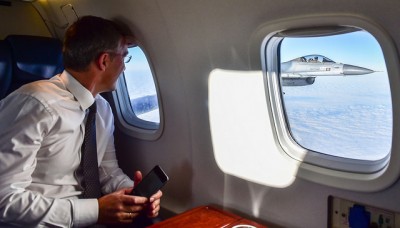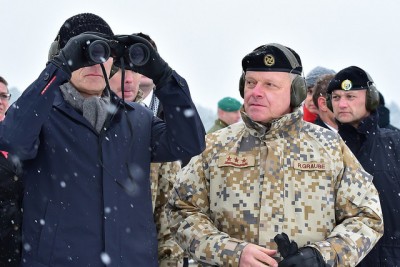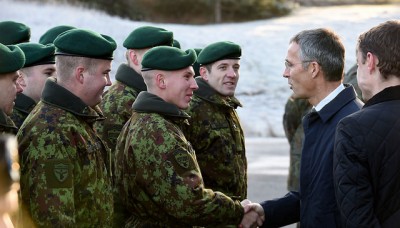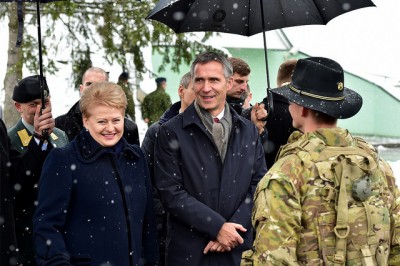Former Norwegian Prime Minister Jens Stoltenberg has been flying around Europe and as far as Afghanistan since taking over as secretary general of NATO two months ago. On Tuesday he was ready to lead his first meeting of all 28 foreign ministers of NATO’s member nations, after what he called “a year of aggression, crisis and conflict.”

The meeting in Brussels is also the first major gathering of NATO members since the Wales Summit, where Stoltenberg was introduced but had no major role. Now he’s responsible for making sure NATO follows through on issues agreed upon in Wales, where leaders discussed plans for Afghanistan, the crisis in Ukraine, plans for a new and faster NATO reaction force and, not least, calls for member nations to increase their defense spending.
“I’m not nervous, but tense about whether we’re doing everything we’re supposed to be doing,” Stoltenberg told newspaper Aftenposten over the weekend. He admits the job he agreed to take on last spring is even bigger and more demanding than he’d expected. He’s had no time at all to get acquainted with Brussels, his new home base, and long days in the office and preparing for meetings at home in the evenings have been accompanied by lots of travel.

Since taking over his post the new NATO boss has visited Poland, Turkey, Greece, Afghanistan, Estonia, Latvia, Lithuania and the Netherlands. He’s met presidents, prime ministers and royalty along with military brass and soldiers.
“In Norway, I liked to work with people with different backgrounds, from the east, west, north and south in the country, from fjords and valleys and cities,” Stoltenberg said. “Here, the differences are much greater. One of my colleagues grew up under Ceausescu in Romania, another was born in Ukraine but is now an American. Here, people reflect Europe’s history.”
He also has to strike a delicate balance between the various interests and backgrounds of the 28 member nations, of which his native Norway is only one. “We have to recognize that NATO’s members have diverse historical experience,” Stoltenberg noted. “Some were under Soviet rule for decades and are more cautious and restrained about having direct political contact with Russia than others. That’s a balance I need to work with.”

It also hasn’t been easy to get member nations to offer enough soldiers for Afghanistan after New Year. The US still has to come up with the majority. Russian aggression in Ukraine has upset NATO members, but they disagree on how much NATO should talk with Russia given the tense situation at present. Former eastern bloc countries are the most skeptical. Stoltenberg, known for getting along with all kinds of people, had good relations with both Russian leaders Dmitry Medvedev and Vladimir Putin when he was prime minister in Norway, which also shares a border with Russia in the far north. Now, representing NATO, his tone is tougher.
“Russia’s aggressive actions have undermined Euro-Atlantic security,” he claimed in remarks prepared for a press briefing in Brussels on Monday, just ahead of the foreign ministers’ meeting. “While efforts for lasting peace continue, we see a significant military build-up in and around Ukraine, large transfers of Russian advanced weapons, equipment and military personnel to violent separatists, and a major increase in Russian military activity around Europe and beyond.” New reports of a Russian convoy crossing the border into eastern Ukraine, allegedly with humanitarian aid, is instead suspected of transporting in military equipment and support for the separatists. Russia has two choices, Stoltenberg said later: “They can either continue to break international law and become more and more isolated, or they can choose to respect international law and their obligations.”

Stoltenberg noted how NATO has already boosted its presence in “the eastern part of our alliance,” with “five times more planes in the air,” new NATO exercises every two days and more ships in the Baltic and Black seas. Norwegian troops are among those sent to the area, as part of the so-called “Task Force Viking” in Latvia.
Meanwhile, Stoltenberg noted now violence and extremism have spread across the Middle East and North Africa. “We welcome the broad coalition effort led by the United States against the terrorist group ISIL, which is actually already showing results,” Stoltenberg told reporters. “All allies are playing their part in this coalition against ISIL.”
He said he expected to see four concrete results from this week’s ministerial meeting: an agreement on “continuous NATO presence” in the east next year, establishment of a “Spearhead Force” to enhance NATO preparedness, strong political and practical support for Ukraine, and the launch of a new support mission in Afghanistan. Stoltenberg was to meet with Afghanistan’s new reform-minded president and chief executive in Brussels on Monday, and both would attend the ministerial meeting on Tuesday.
newsinenglish.no/Nina Berglund

